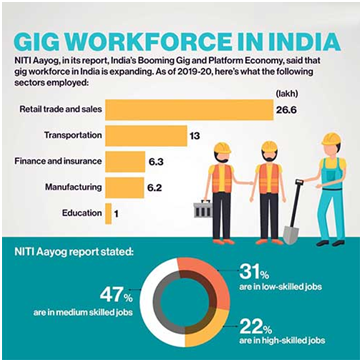Why in News?
- Taking note of absence of any specific welfare scheme by the government for gig and platform workers, a parliamentary panel has asked the Ministry of Labour and Employment to formulate and implement welfare schemes for such workers at the earliest.
What’s in Today’s Article?
- About Gig Economy (Meaning, Gig Workers, Size of Economy, Average Income, Challenges, etc.)
- News Summary
What is Gig Economy?
- A gig economy is a free market system in which organisations hire or contract workers for a short span of time.
- Simply put, the positions are temporary to meet the company’s requirements by having short-term engagements.
- Startups like Ola, Uber, Zomato, and Swiggy have established themselves as the main source of the gig economy in India.
Who is a Gig Worker?
- According to the Code on Social Security, 2020 (India), “A gig worker is a person who performs work or participates in work arrangements and earns from such activities, outside of the traditional employer-employee relationship.”
- They are independent contractors, online platform workers, contract firm workers, on-call workers and temporary workers.
- Participation in the gig economy is higher in developing countries(5-12 percent) versus developed economies(1-4 percent).
- Most of these jobs are in lower-income job-types such as deliveries, ridesharing, microtasks, care and wellness.
What is the size of Gig Economy in India?

- In 2020-21, ~77 lakh workers were engaged in the gig economy. The gig workforce is expected to expand to 2.35 crore workers by 2029-30.
- The median age of Indian gig workers is 27 and their average monthly income is Rs 18,000.
- Of these, about 71 per cent are the sole breadwinners of their families. Additionally, gig workers operate with an average household size of 4.4.
- These figures clearly indicate the importance of the gig working community in the Indian economy.
- Ensuring the comfort and security of this community is investing in a more progressive and prosperous future.
Challenges Faced by Gig Workers:
- While platform companies have created avenues of employment, it has often been marred by low wages, unequal gender participation, and a lack of possibility for upward mobility within an organisation.
- This has triggered protests from workers at companies like Swiggy, Zomato, Ola, Uber, and Urban Company, among others.
- Gig workers are typically hired by companies on a contractual basis and are not considered their employees.
- As a result, they do not receive some of the benefits that an on-roll employee of the company may have.
- This means they often do not receive benefits like paid sick and casual leaves, travel and housing allowances, and provident fund savings, etc.
What needs to be done in order to improve the Living Standards of these Gig Workers?
- Fiscal Incentives –
- NITI Aayog’s “India’s Booming Gig and Platform Economy” report highlights that fiscal incentives such as tax-breaks or startup grants may be provided for businesses that provide livelihood opportunities to women.
- Retirement Benefits –
- The report also recommended firms adopt policies that offer old age or retirement plans and benefits, and other insurance cover for contingencies such as the Covid-19 pandemic.
- Such plans and policies may be envisaged under the Code on Social Security, 2020.
- The Rajasthan Platform Based Gig Workers (Registration and Welfare) Act 2023 –
- Under the Act, a board will be established to ensure gig workers’ registration and welfare, addressing their vulnerabilities and providing a platform for collective bargaining and negotiations.
- The board can serve as an independent grievance redress mechanism.
- The Act also has a provision of establishing a social security fund funded through a fee on every transaction.
News Summary:
- Standing Committee on Labour, Textiles, Skill Development has asked the Ministry of Labour and Employment to formulate and implement welfare schemes for gig workers at the earliest.
- The committee had noted that since gig and platform workers do not come under the purview of Employees’ Provident Fund and Miscellaneous Provisions Act, appropriate welfare schemes for unorganised sector workers and gig and platform workers are needed.
- The Ministry in its reply had said that a MoU has been signed with the National Law School of India University, Bangalore for assistance in framing of a new scheme for the gig and platform workers as well as workers in the unorganised sector.









